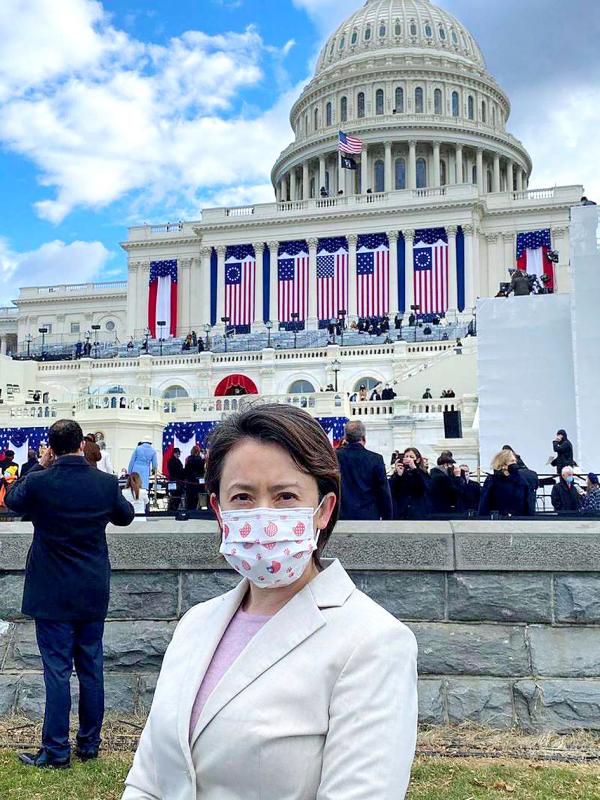President Tsai Ing-wen (蔡英文) yesterday congratulated US President Joe Biden and US Vice President Kamala Harris on their inauguration, and reiterated the nation’s commitment to advancing ties with its “most important ally,” after the Taiwanese envoy in Washington was formally invited to the ceremony, the first since the two sides severed ties in 1979.
“Taiwan and the US have long had diverse and close cooperation on all manner of issues,” Tsai wrote on Facebook, lauding the “warm and deep friendship” between the people of the two nations.
She wished the new administration well in carrying out its policies, and vowed to deepen the Taiwan-US relationship to “contribute the positive forces of democracy and freedom” to the world.

Photo courtesy of the Taipei Economic and Cultural Representative Office in the US
The president also thanked the administration of former US president Donald Trump, including its diplomats, as well as bipartisan supporters for a fruitful four years.
The warming ties were fully evidenced by the formal invitation offered to Representative to the US Hsiao Bi-khim (蕭美琴) to attend the inauguration on Wednesday, Tsai said.
The US Joint Congressional Committee on Inaugural Ceremonies, in a break from tradition, formally invited Taiwan’s representative to attend for the first time since 1979.
In previous inaugurations, Taiwanese representatives have been invited as guests of US congressional members or organizations.
The Ministry of Foreign Affairs in a news release yesterday confirmed the nature of the invitation to the “most important democratic event in the US.”
The gesture “demonstrates the two nations’ close friendship formed on the basis of shared values,” it said. “On this existing foundation, we will continue to promote exchanges and cooperation on all levels and in all areas with the Biden administration.”
Ministry spokeswoman Joanne Ou (歐江安) said that Hsiao was invited in the same capacity as other honored guests, including permission to bring a plus-one.
It was not the only time Taiwanese officials have attended, Ou said, but stressed the “great significance” of this invitation, especially as the event was pared down amid the COVID-19 pandemic.
Asked why the ministry did not announce the invitation earlier, Ou said that the ministry had no ulterior motives.
Based on experience, it is ministry policy not to publicize such invitations in advance, Ou said.
The ministry prefers to first use the “most appropriate method” to offer congratulations, she said.
A ministry statement saying that the “probability [of attending the inauguration] is low” referenced sending a delegation to Washington, she said, adding that it said nothing about Hsiao.
“Anyone who says there is ‘no way in’ is making an incorrect assumption,” she said, referencing Chinese Nationalist Party (KMT) Legislator Ma Wen-chun’s (馬文君) statement on Wednesday that the Tsai administration’s deference to the US Republican Party had harmed its future with the Biden administration.
The KMT is positive about advances in Taiwan-US ties, KMT Chairman Johnny Chiang (江啟臣) said, but added that it is more important to convert formal exchanges into tangible mutual benefits.
Additional reporting by CNA

The combined effect of the monsoon, the outer rim of Typhoon Fengshen and a low-pressure system is expected to bring significant rainfall this week to various parts of the nation, the Central Weather Administration (CWA) said. The heaviest rain is expected to occur today and tomorrow, with torrential rain expected in Keelung’s north coast, Yilan and the mountainous regions of Taipei and New Taipei City, the CWA said. Rivers could rise rapidly, and residents should stay away from riverbanks and avoid going to the mountains or engaging in water activities, it said. Scattered showers are expected today in central and

COOPERATION: Taiwan is aligning closely with US strategic objectives on various matters, including China’s rare earths restrictions, the Ministry of Foreign Affairs said Taiwan could deal with China’s tightened export controls on rare earth metals by turning to “urban mining,” a researcher said yesterday. Rare earth metals, which are used in semiconductors and other electronic components, could be recovered from industrial or electronic waste to reduce reliance on imports, National Cheng Kung University Department of Resources Engineering professor Lee Cheng-han (李政翰) said. Despite their name, rare earth elements are not actually rare — their abundance in the Earth’s crust is relatively high, but they are dispersed, making extraction and refining energy-intensive and environmentally damaging, he said, adding that many countries have opted to

FORCED LABOR: A US court listed three Taiwanese and nine firms based in Taiwan in its indictment, with eight of the companies registered at the same address Nine companies registered in Taiwan, as well as three Taiwanese, on Tuesday were named by the US Department of the Treasury’s Office of Foreign Assets Control (OFAC) as Specially Designated Nationals (SDNs) as a result of a US federal court indictment. The indictment unsealed at the federal court in Brooklyn, New York, said that Chen Zhi (陳志), a dual Cambodian-British national, is being indicted for fraud conspiracy, money laundering and overseeing Prince Holding Group’s forced-labor scam camps in Cambodia. At its peak, the company allegedly made US$30 million per day, court documents showed. The US government has seized Chen’s noncustodial wallet, which contains

SUPPLY CHAIN: Taiwan’s advantages in the drone industry include rapid production capacity that is independent of Chinese-made parts, the economic ministry said The Executive Yuan yesterday approved plans to invest NT$44.2 billion (US$1.44 billion) into domestic production of uncrewed aerial vehicles over the next six years, bringing Taiwan’s output value to more than NT$40 billion by 2030 and making the nation Asia’s democratic hub for the drone supply chain. The proposed budget has NT$33.8 billion in new allocations and NT$10.43 billion in existing funds, the Ministry of Economic Affairs said. Under the new development program, the public sector would purchase nearly 100,000 drones, of which 50,898 would be for civil and government use, while 48,750 would be for national defense, it said. The Ministry of